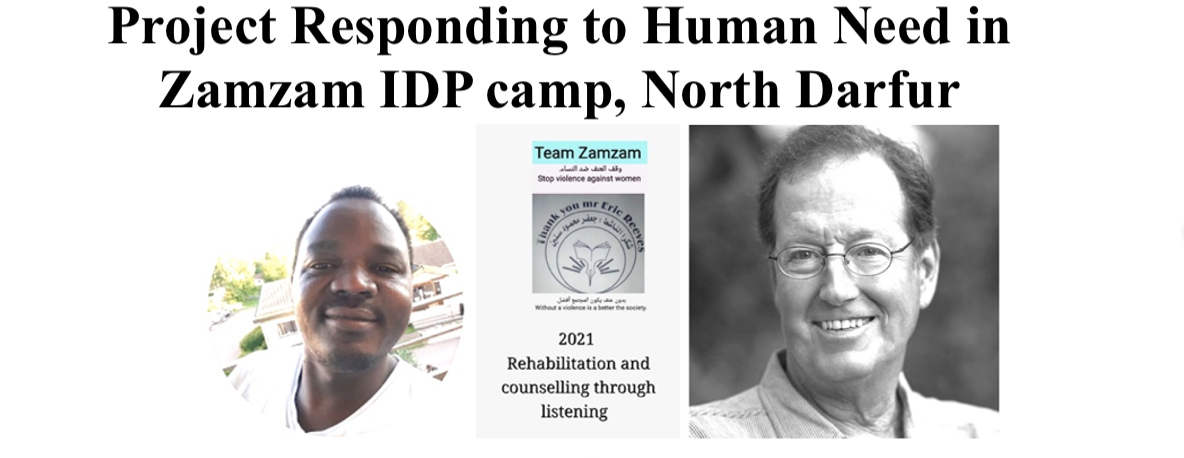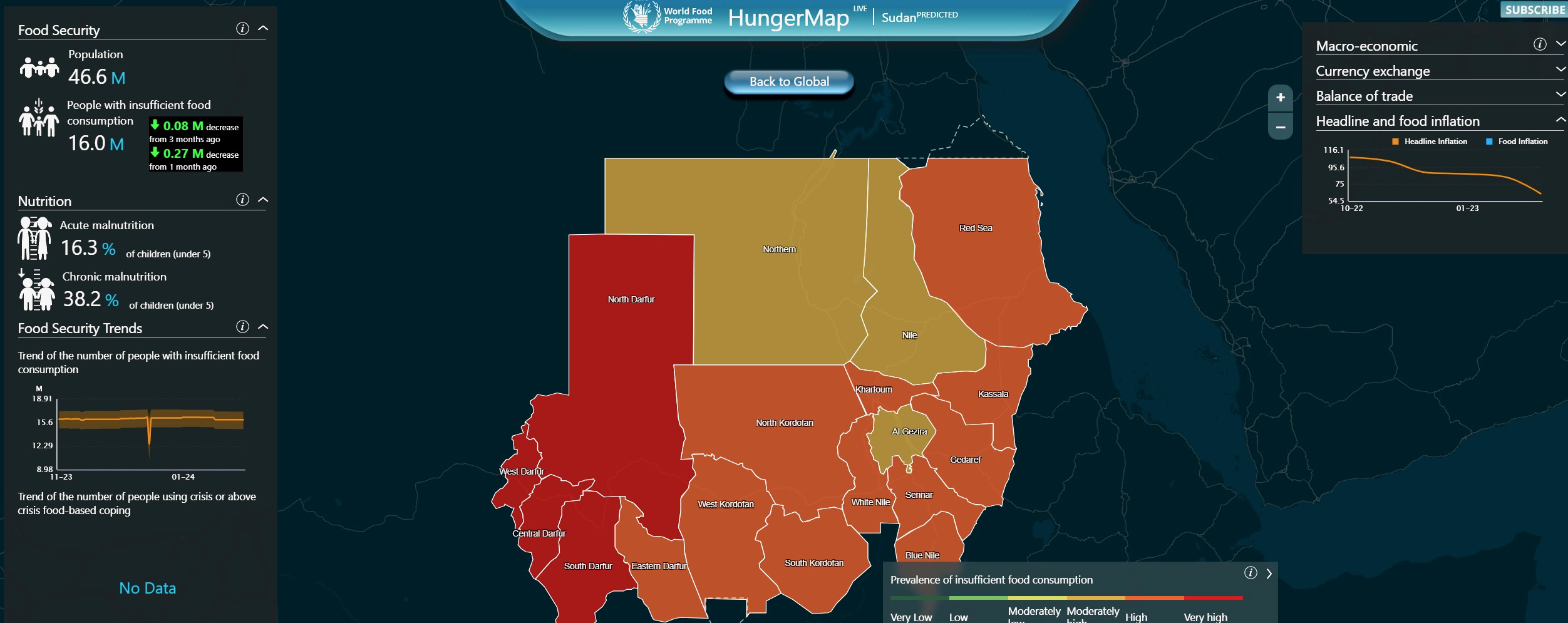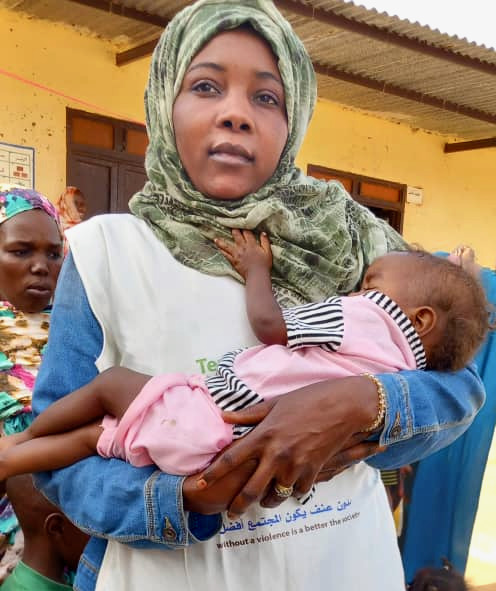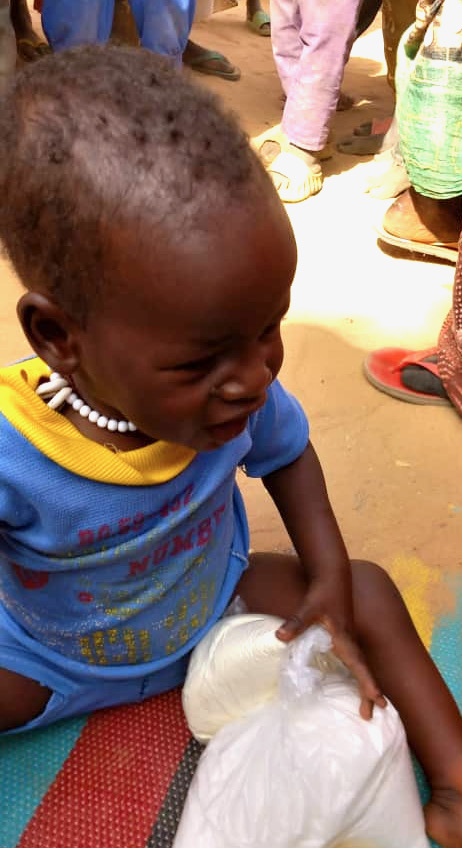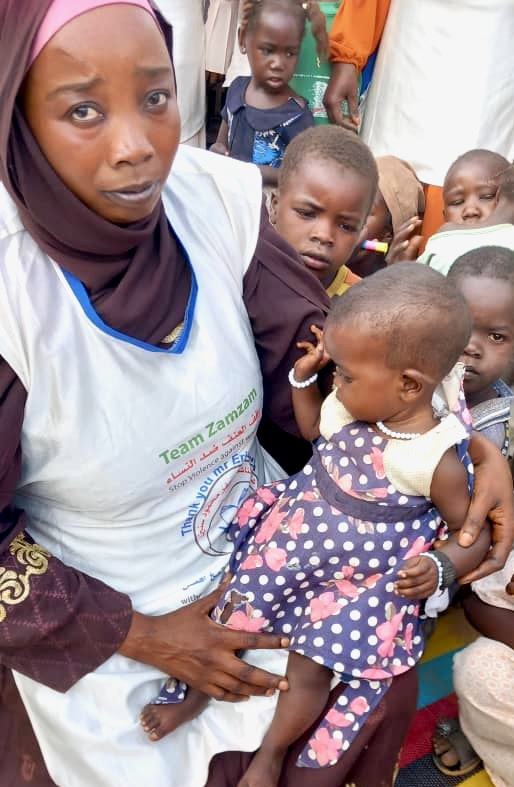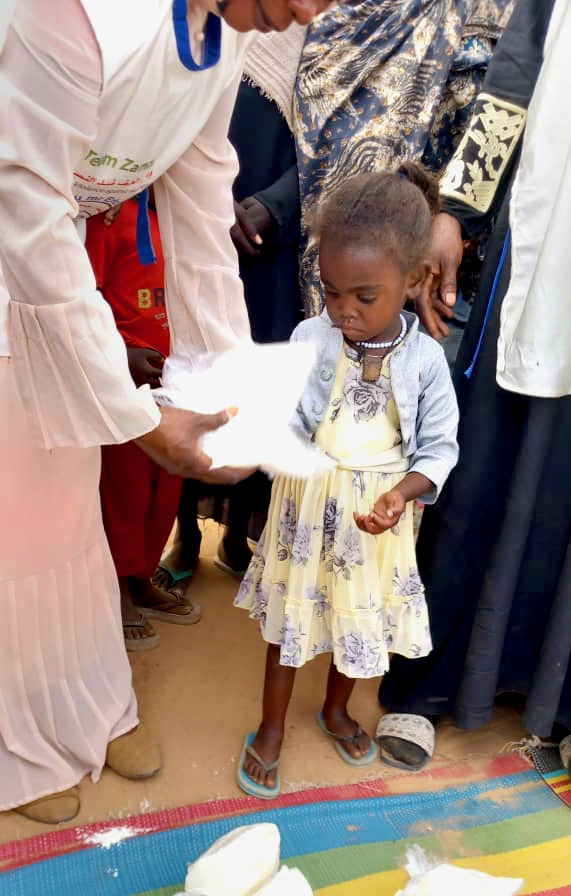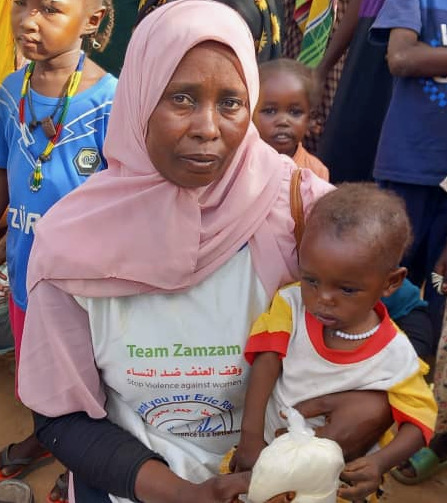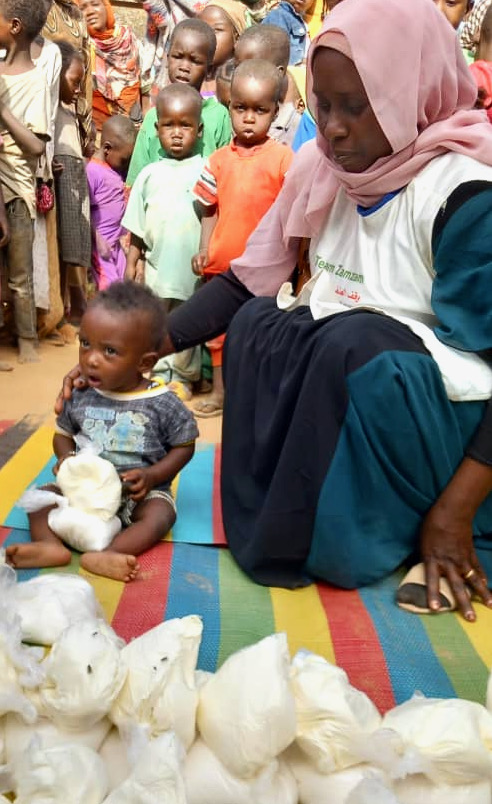It seems futile to try to generalize about food insecurity in Darfur looking only at Zamzam IDP camp: Darfur, indeed Sudan as a whole, is experiencing widespread, acute malnutrition that ensures present pockets of famine will rapidly expand in the coming weeks. I offer at the end of this update a brief bibliography of the most recent authoritative accounts of this growing malnutrition, including the Severe Acute Malnutrition (SAM, also known as “Severe Wasting”) that is claiming the lives of more and more children. I would highlight in particular this map froms the International Food Security Phase Classification.
In Zamzam itself, an epidemiological study by Doctors Without Borders/Médecins Sans Frontières (MSF) in Zamzam at the beginning of February of this year found that:
Almost a quarter of children screened during the assessment were found to be acutely malnourished, with seven per cent having severe acute malnutrition (SAM). Among children aged six months to two years old, the figures were even more stark with nearly 40 per cent of this age group malnourished – 15 per cent with SAM.
Put more starkly yet, MSF found that: “a child was dying of hunger every two hours.
The MSF report continued with its ghastly assessment of Zamzam (perhaps the only study of its kind for all of Darfur): it found a Crude Mortality Rate of 2.5 (deaths per 10,000 of surveyed population per day), more than double the emergency humanitarian threshold. A spokesperson in the same report warned that: “Those with severe malnutrition who have not yet died are at high risk of dying within three to six weeks if they do not get treatment. Their condition is treatable if they can get to a health facility. But many cannot.”
This warning was issued at the beginning of February; it is now the beginning of April—and no significant augmentation of humanitarian resources is evident.
The situation is also desperate in other parts of Sudan. For example, in Blue Nile and Gedaref States the Integrated Food Security Phase Classification (IPC) reports:
“Recent surveys reveal a deteriorating nutrition situation compared to previous assessments. In Baw and Geissan localities, Global Acute Malnutrition (GAM) prevalence has risen from 3.04% to 9.6% and from 3.91% to 14.0%.” (Integrated Food Security Phase Classification: IPC, Alert, Sudan [March 2024]
It is clear to all informed observers that Sudan’s is now the greatest humanitarian crisis in the world, far greater in numbers than Gaza or anywhere else. Malnutrition is set to take a ghastly toll in human life, particularly among children. One recent medical study of malnutrition has emphasized that:
Malnutrition remains one of the most common causes of morbidity and mortality in children throughout the world. It is responsible directly or indirectly for 60% of the 10.9 million deaths annually among under-five children and two-thirds of these deaths occur during the first year of life.
Hunger kills—and it is now killing widely and cruelly in Zamzam; and the children dying of starvation are taking their place in this intolerable global statistic.
***URGENT HUMANITARIAN INTERVENTION IS REQUIRED***
[I will take a moment here to explain how it is possible to assist our efforts in mitigating this disaster:
Assistance is urgently needed and will be deeply appreciated by Team Zamzam, and by the girls and women—indeed all camp residents—whose suffering they seek to alleviate. Here I should stress the tremendous efficiencies of food, hygiene, and medical purchases by a staff with local knowledge, as well as the importance of their deep understanding of where need is greatest within this vast camp, swollen with recent displacements caused by insecurity.
NB: It is now possible to make a tax-deductible contribution to our project, using a portal on the website of a 501/c/3 organization operating in Sudan. Operation Broken Silence, working primarily on health and education issues in the Nuba Mountains of South Kordofan, has created a special site for tax-deductible contributions to our project, and we hope this makes contributing to the health and well-being of girls and women in Zamzam as well as to others in desperate need.
We also hope that all will keep in mind our project as a whole operates with truly extraordinary efficiency, in ways matched by no humanitarian organization operating in Darfur that I am aware of, a region I have been researching for two decades. There is absolutely no overhead expense for this project.
Those wishing to assist in funding the work of Team Zamzam may also send a check directly to Eric (Eric Reeves, 31 Franklin St., Northampton, MA 01060)
OR
Purchase one of his woodturnings: https://www.ericreeves-woodturner.com/gallery
ZAMZAM: THE GRIMMEST OF FUTURES
Although our project in Zamzam remains deeply committed to providing assistance to the girls and women who have been traumatized by brutal, finally genocidal sexual violence over many years, we are also committed to doing whatever is possible with our limited budget to help those families and individuals who are most vulnerable to food insecurity survive the coming months, with the hope that international food aid will arrive before the next rainy season. But the obstacles to such aid are made painfully clear on a daily basis; Radio Dabanga recently reported (March 3, 2024) on the blocking, by the Rapid Support Forces, of a critical humanitarian convoy attempting to make its way south from Mellit to El Fasher in North Darfur
“The acting Ministry of Foreign Affairs in Port Sudan on Friday accused the Rapid Support Forces (RSF) of seizing humanitarian aid trucks on their way to El Fasher. The ministry said that the RSF deploy[ed] its forces near Mellit to block the road to aid convoys and seize them, to prevent the arrival of humanitarian relief transported via the northern Sudanese route Ed Debba [Northern State]-Mellit-El Fasher.” (Radio Dabanga, El Fasher, March 31, 2024)
While it is impossible to take at face value such claims from someone who is a spokesperson not for some “government of Sudan” but rather for the Sudan Armed Forces (SAF) claiming such a role, there are far too many reports of this nature to have much doubt, especially since we know that such a convoy was indeed in Mellit with humanitarian assistance—and was bound for El Fasher.
Our project in Zamzam is directly funding local humanitarian workers and the local purchasing of humanitarian supplies, including food. Moreover, in addition to providing what supplies our budget accommodates, we are also committed to providing clean water to as many people as possible, and have now rehabilitated eight critical water wells, in the process assisting some 15,000 people with clean water, an increasingly scarce resource during the present dry season.
WHO WE ARE AND WHAT WE DO
Team Zamzam comprises twenty salaried counselors (as well as a growing number if volunteers), providing psychosocial counseling—at this point to more than five thousand girls and women suffering the consequences of rape—as well as assisting women with hygiene and three reparative surgeries for traumatic fistulas per month. Team Zamzam is now skilled in both pre- and post-operative care for such surgeries, and the gratitude of some is clear in numerous testimonials.
Team Zamzam obtains food from El Fasher and oversees the distribution of this food to those most needy within the camp. This account comes from the coordinating counselor of Team Zamzam:
On March 3, 2024 we moved at seven in the morning and headed towards the second shelter center in [Zamzam] camp. We targeted two centers where living conditions are very difficult: Al Salam Center 18 and Zamzam Secondary School for Boys. These two centers house a very large number of families, 812 in total. Of these, about 600 families were targeted for assistance with the food we had available; they were selected under the supervision of the organizing committee within the center.
Specific cases include:
111 families experiencing severe shortages of food
100 Children with special needs (e.g., paralyzed children)
150 orphans suffering from severe malnutrition
140 widows
89 very elderly people
10 people with special needs (deaf, blind, mentally disabled).
Other work in March by Team Zamzam can be found in the full monthly report from the coordinating counselor.
RETROSPECTIVE
Twenty years ago, at the beginning of the Darfur genocide, I published in The Washington Post a column give the title “Unnoticed Genocide.” More op/eds would follow, but they soon would begin to lament the growing invisibility of massive, ethnically-targeted destruction—destruction that has continued to this day. Eleven years later in a piece published by the Post on May15, 2015—nine years ago—I spoke of “The World’s Abandonment of Darfur.” This was at a time when the genocidal rampage of the Rapid Support Forces under the command of Hamdan Dagalo (Hemedti) was in full swing, animated by the words of then-Vice President of the al-Bashir regime:
Ahmed, a [defecting] 35-year-old officer in the Border Guards, spent two weeks at a military base in Guba [South Darfur] in December 2014 before being sent to fight rebels around Fanga. Two senior RSF officials, the commanding officer, Alnour Guba, and Col. Badre ab-Creash were present on the Guba base.
Ahmed said that a few days prior to leaving for East Jebel Marra, Sudanese Vice President Hassabo Mohammed Abdel Rahman directly addressed several hundred army and RSF soldiers: “Hassabo told us to clear the area east of Jebel Marra. To kill any male. He said we want to clear the area of insects. … He said East Jebel Marra is the kingdom of the rebels. We don’t want anyone there to be alive.” (Human Rights Watch, “‘Men With No Mercy’: Rapid Support Forces Attacks against Civilians in Darfur, Sudan” (September 9, 2015 https://www.hrw.org/report/2015/09/09/men-no-mercy/rapid-support-forces-attacks-against-civilians-darfur-sudan
*******
We are far too close to making true once again the words with which I ended my 2004 piece in The Post:
“The international community has been slow to react to Darfur's catastrophe and has yet to move with sufficient urgency and commitment. A credible peace forum must be rapidly created. Immediate plans for humanitarian intervention should begin. The alternative is to allow tens of thousands of civilians to die in the weeks and months ahead in what will be continuing genocidal destruction.”
Of course, the human destruction would soon have to be measured in the hundreds of thousands of deaths, not “tens of thousands.” And if the dynamics of the racial and ethnic hatred have changed in Darfur—along with the political and military realities that threaten Sudan so deeply as a whole—we have far too much evidence of conspicuous violations of the 1948 UN “Convention on the Prevention and Punishment of the Crime of Genocide”:
Article II In the present Convention, genocide means any of the following acts committed with intent to destroy, in whole or in part, a national, ethnical, racial or religious group, as such:
[a] Killing members of the group;
[b] Causing serious bodily or mental harm to members of the group;
[c] Deliberately inflicting on the group conditions of life calculated to bring about its physical destruction in whole or in part;
[d] Imposing measures intended to prevent births within the group;
[e] Forcibly transferring children of the group to another group.
Our project in Zamzam IDP camp —home to a population of some 400,000 people that is almost exclusively African/non-Arab—is to do what we can to ensure that efforts to inflict on this population “conditions of life calculated to bring about [this group’s] physical destruction” do not succeed. For far too many, we are too late.
FAMINE IN SUDAN
• IPC Alert: Sudan (March 29, 2024)https://www.ipcinfo.org/fileadmin/user_upload/ipcinfo/docs/IPC_Alert_Sudan_March2024.pdf
• Famine Early Warning System Network (FEWSNet): “In Sudan’s breadbasket threaten national food availability,” February 1, 2024 https://fews.net/east-africa/sudan/alert/february-2024
• Human Rights Watch: “Sudan: Urgent Action Needed on Hunger Crisis: Security Council Should Act on Access for Aid Deliveries,” March 15, 2024
Doctors Without Borders/Médecins Sans Frontières (MSF),February 5, 2024 “URGENT RESPONSE NEEDED AMID HIGH DEATH RATES AND MALNUTRITION CRISIS IN NORTH DARFUR,”
A collection of photographs of malnourished children in Zamzam; the degree of malnutrition can be difficult to detect in such photos, but all here are suffering from moderate acute malnutrition or in some cases severe acute malnutrition.


